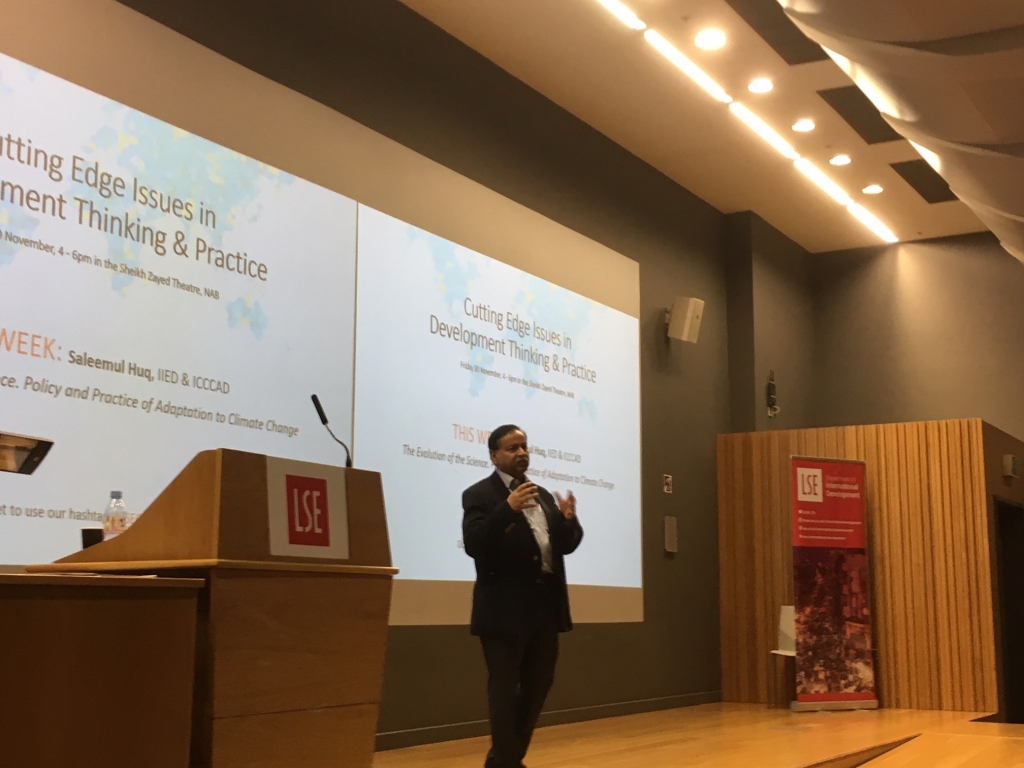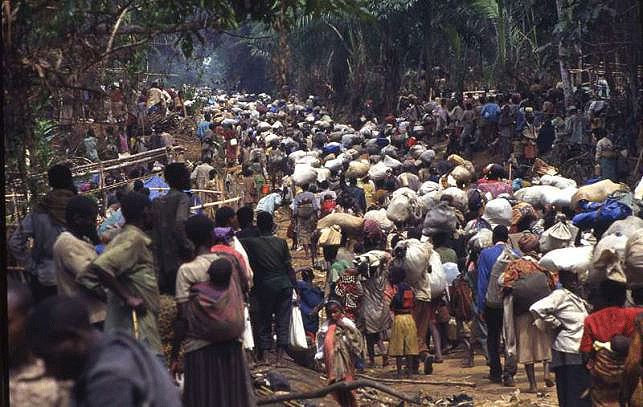On Friday, 30 November, Dr Saleemul Huq of the International Institute for Environment and Development and the International Centre for Climate Change and Development gave a talk for the International Development Department’s Cutting Edge Issues in Development lecture series. Here’s what two of the Department’s students took away from his lecture.

As this week marks the 10th anniversary of the UK’s landmark Climate Change Act and the COP24 kicking off in Katowice, Poland, Saleemul Huq’s engaging lecture acts as an additional reminder that the climate for change is now.
The symbiotic link between climate change adaptation and economic development is quickly brought up: having represented the 48 least developed countries in international climate negotiations, Saleemul Huq insists that because these countries are most vulnerable to impacts of changing climate patterns, climate change adaptation and poverty alleviation efforts necessarily overlap. Developing countries are hence also most concerned with loss and damage aspects of climate change impacts (essentially dealing with liability and compensatory measures related to extreme weather events). As it currently stands, the only innovative financing solution is climate insurance –which in vulnerable communities begs the question: who should pay the risk premium? And how can worsening climate change predictions be factored into premium calculations? Will some insurers go into liquidation, while others hike premiums up? Mott Macdonald estimates that climate-related losses attributed by global insurers will reach US$1 trillion over the next two decades. Although the insurance industry’s reaction to climate change as a threat to their sustainability has been slow, looking at the cost of recovery may be the wrong conversation to have…
Perhaps measuring the cost of adaptation is a more fruitful conversation to have. This brings us back to Saleemul Huq, and his push for adaptation measures to be transformative with a focus on building resilience, as opposed to the first-order in-situ manoeuvres that run the risk of being counter-productive if maladaptive. Although Huq clarifies how states and civil society can improve their resilience-building measures, it remains unclear how businesses can render their climate change adaptation strategies resilient. The latter have been faced with the challenges of evolving consumer demands, meeting regulatory requirements, a growing demand for increased transparency in sustainability reporting and HR issues such as equipping employees with the skills to manage the surge in climate change initiatives. Still, as the concept of business model resilience to climate change gains momentum despite regulatory uncertainty, how can climate policies provide businesses with greater confidence in their transition to low-carbon investments?
Celine Zins is a part-time MSc Development Management student at the LSE, working in environmental compliance and macroeconomic analysis for an EPC contractor. A Development Economics graduate from SOAS, her interests include the history of growth and competition theories as well as the nexus between development and environmental degradation.
_______________
“Hell is truth seen too late”… Thomas Hobbes
Climate change is a topic with a big scope, stretching from the activities of individuals to the workings of big corporations, and impacts the tiniest organism living on the planet. The Bangladeshi researcher and tireless climate change campaigner Dr Saleemul Huq did well to discuss the topic at all levels. Since we are all in this together, we could all make a contribution, he emphasized, like adopting eco-friendlier lifestyles and organizing to ring louder the bells calling on world leaders to act quickly on climate change and stop our slow self-immolation under warming temperatures.
Fifty years after the Silent Spring, numerous, more rigorous scientific studies are ringing loudly to call global attention to human-induced climate change that could bring an ecological cataclysm, far greater than any DDT-induced environmental catastrophe; yet, President Donald J. Trump remains unperturbed. Amazing! And, just like their counterparts in the chemical industry did fifty years ago, the big fossil fuel companies continue to use disinformation and propaganda to distort public discourse. Politicians are beholden to big fuel companies because they fund their campaigns, thus, lack the “political will” to push through international treaties to halt the planet’s slow march to an ecological meltdown, according to Dr Saleemul Huq.
Erstwhile Unilever CEO, Paul Polman, recently remarked in an interview that in dealing with the symptoms of climate change in Florida and Texas there is a readiness to spend over 200 billion USD; yet, all the countries in the world are finding it difficult to pool 100 billion USD into the Green Climate Fund—according to Dr Huq, this fund is committed, in principle, to distribute funds equally (50:50) between mitigation and adaptation. Thus, breaking the funding structure which is currently skewed (80:20) in favour of mitigation. Concerning the symptoms of climate change the Bangladeshi scientist had a lot of examples to share.
The impacts of climate change are already being felt in most places: increased frequency of flooding and salinization of freshwater aquifers in Bangladesh, wildfires and hurricanes in America are examples. However, funding for climate change adaptation lags behind funding for mitigation (reducing emissions). This is because adaptation remains a “more complicated” concept, says Dr Huq, and “just learning what is adaptation and what is development has taken time”.
Dr Huq highlighted various adaptation strategies which are being adopted, quite successfully, in highly vulnerable places like Bangladesh to deal with changing weather conditions like increased frequency of cyclones and flooding. Especially mitigating distress-induced migration caused by climate change with “transformative adaptation”, which involves deliberately moving younger generations into new, more resilient and planned cities.
My big take away from the lecture is the knowledge that there exists a courageous team of concerned citizens, at every COP meeting, who will not give up until big changes are made by the biggest polluters. I have been inspired to contribute my widow’s mite.
Noble Kofi Nazzah is an MSc African Development candidate at the LSE and holds a BSc in Chemistry from the University of Ghana. Noble’s research interests include industrial policy and economic development in sub-Saharan Africa.
This Friday, 7 December, we’re having our last Cutting Edge Issues in Development lecture of the term: Melissa Parker of the London School of Hygiene and Tropical Medicine will be speaking on “Responding to the Ebola Crisis in Sierra Leone: External Interventions or Traditional Practices?” The lecture will take place from 4 to 6pm in the Sheikh Zayed Theatre in the New Academic Building at the LSE. External guests should contact D.Patel20@lse.ac.uk to reserve a seat.
The views expressed in this post are those of the author and in no way reflect those of the International Development LSE blog or the London School of Economics and Political Science.





